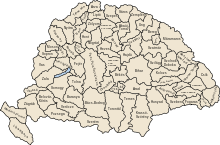county
Jump to navigation
Jump to search
See also: County
English[edit]

Etymology[edit]
From Middle English countee, counte, conte, from Anglo-Norman counté, Old French conté (French comté), from Latin comitātus (“jurisdiction of a count”), from comes (“count, earl”). Cognate with Spanish condado (“county”) and Italian contea (“county”). Doublet of comitatus, borrowed directly from Latin. Mostly displaced native Old English sċīr, whence Modern English shire.
Pronunciation[edit]
- (General American, Received Pronunciation) IPA(key): /ˈkaʊnti/
Audio (US) (file) - Rhymes: -aʊnti
Noun[edit]
county (countable and uncountable, plural counties)
- An administrative or geographical region of various countries, including Bhutan, Canada, China, Croatia, Ireland, Japan, New Zealand, Norway, Poland, Romania, South Korea, Sweden, the United Kingdom, and 48 of the 50 United States (excluding Alaska and Louisiana).
- A definitive geographic region, without direct administrative functions.
- (US, slang, uncountable) A jail operated by a county government.
- He can't come; he's up in the county for agg assault.
- (historical) The land ruled by a count or a countess.
Usage notes[edit]
- In US usage, counties are almost always designated as such, with the word "County" capitalized and following the name — e.g., "Lewis County", rarely "Lewis", and never "County Lewis".
- In British usage, counties are referenced without designation — e.g. "Kent" and never "Kent County". The one exception is Durham, which is often "County Durham" but never "Durham County". An organisation such as Kent County Council is the "County Council" of "Kent" and not the "Council" of "Kent County".
- In Irish usage, counties are designated as such, with the word "County" capitalised and preceding the name — e.g., "County Carlow".
- In Canadian usage, counties are typically designated as such, with the word "County" capitalized and usually preceding the name — e.g., "the County of Two Hills". Occasionally, "County" follows the name, as in "Sturgeon County".
Synonyms[edit]
- (from Mandarin Chinese) hsien, xian
Derived terms[edit]
- 32-county
- another county heard from
- ceremonial county
- city and county
- county at large
- county borough
- county boundary
- county brownie
- county council
- county court
- county cricket
- county fair
- county family
- county farm
- County Gates
- countyhood
- county jail
- county-level city
- county line
- county palatinate
- county palatine
- county seat
- county town
- countywide
- God's own county
- historic county
- Home Counties
- home county
- intercounty
- metropolitan county
- Norfolk County
- Orangeburg County
- preserved county
- registration county
- Sharkey County
- Six Counties
- traditional county
- tricounty
- Twenty-Six Counties
Related terms[edit]
Descendants[edit]
Translations[edit]
administrative region of various countries
|
land ruled by a count or countess
|
See also[edit]
Adjective[edit]
county (comparative more county, superlative most county)
- Characteristic of a ‘county family’; representative of the gentry or aristocracy of a county.
- 1886, Andrew Lang, The Mark of Cain:
- Now, in the district around Chipping Carby, the County Families are very County indeed, few more so.
- 1979, John Le Carré, Smiley's People, Folio Society, published 2010, page 274:
- She was a tall girl and county, with Hilary's walk: she seemed to topple even when she sat.
- 2007, Heather Julien, Gender and Literacy in Britain, 1847--1987, →ISBN:
- The other two, like many of her characters, have fallen on harder times: Joan's family has recently lost her father, a small flour-mill owner -- described by a supporter as more "county" than the upstart newcomers who covet their property ...
- 2015, Kate Macdonald, Novelists Against Social Change: Conservative Popular Fiction, 1920-1960, →ISBN:
- Susan Dean realises that her secretary, Eleanor Grantly, is much more county than she ever will be, because Eleanor knows all the Barsetshire family connections and is connected herself.
Categories:
- English terms inherited from Middle English
- English terms derived from Middle English
- English terms derived from Anglo-Norman
- English terms derived from Old French
- English terms derived from Latin
- English doublets
- English 2-syllable words
- English terms with IPA pronunciation
- English terms with audio links
- Rhymes:English/aʊnti
- Rhymes:English/aʊnti/2 syllables
- English lemmas
- English nouns
- English uncountable nouns
- English countable nouns
- American English
- English slang
- English terms with usage examples
- English terms with historical senses
- English adjectives
- English terms with quotations
- en:Administrative divisions
